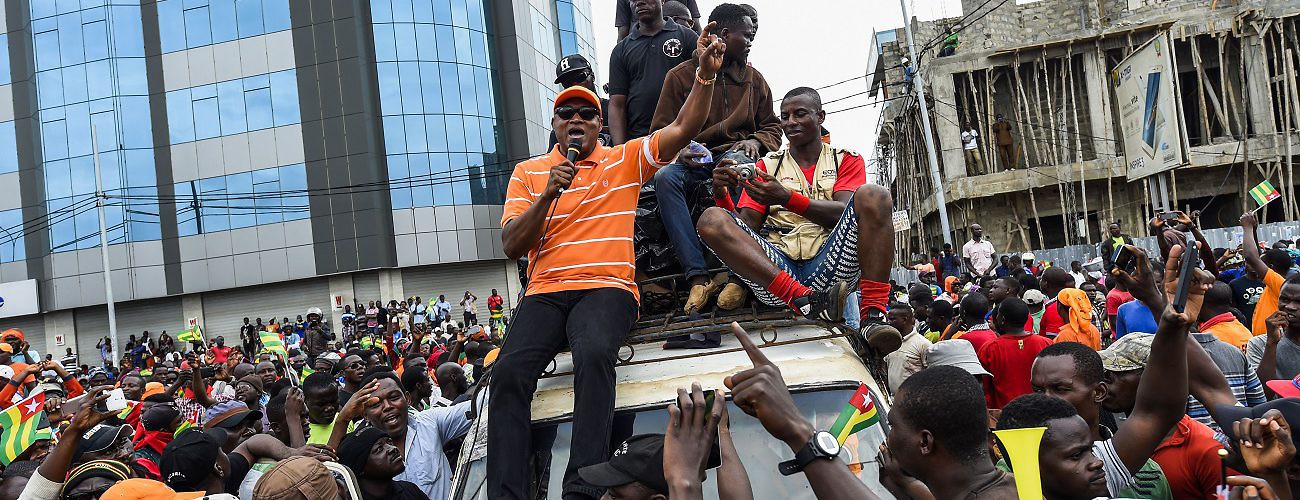Togo opposition leader Jean-Pierre Fabre addresses crowds of anti-government protester. September 7, 2017, Lome, Togo (Pius Utomi Ekpei/AFP/Getty Images)
For many in Togo, the quest for a two-term presidential limit has remained a decade-long dream since the demise of former leader Gnassingbé Eyadema in 2005. This agitation has resurfaced in the past two months, led by a coalition of opposition parties and protesters in the capital Lome and other cities such as Sokode, Dapaong, and Kara.
Eyadema modified the country’s 1992 Constitution in 2002 to run for a third time, and efforts by opposition parties to restore the previous two-term limit have proven abortive ever since. Attempts in 2015 by the Economic Community of West African States (ECOWAS) to introduce a mandatory two-term presidential limit within the bloc proved similarly unsuccessful due to the reservations of Togo and Gambia, the only two countries in West Africa without term limits. (Nonetheless, the December 2016 elections eventually afforded Gambians the opportunity to end the 22-year rule of President Yahya Jammeh.)
Togo’s current president, Faure Gnassingbé, followed his father Eyadema into a third term in 2015 and the Gnassingbé family has now ruled the country for 50 years. This is despite it coming under strong criticism for its poor management of the economy, endemic corruption, political intimidation, and other examples of bad governance.
Analysts have described the recent protests as unprecedented in size, particularly the one that occurred on September 6, which saw thousands participate. The timing of the demonstrations is believed to be linked to the now postponed Africa-Israel Summit, which was due to take place in Lome in October this year but was opposed by Arab countries and the Togo opposition, both of whom were concerned it could give added legitimacy to the organizers. The opposition are similarly opposed to Lome hosting the upcoming ECOWAS Summit in December.
While the huge numbers showed the frustrations with the ruling Union for the Republic (UNIR), it is uncertain whether further demonstrations can cause meaningful change. Nor is it clear that the government’s new proposal for a constitutional amendment to limit presidential tenures to two terms is genuine.
The historical evidence suggests a continuation of the status quo. Indeed, this is not the first time such proposals have been made. Prior to the 2015 election, a similar bill for constitutional reform was submitted to the National Assembly but voted down by the UNIR, with its strong majority. Currently, the ruling party still maintains a majority of seats (62 out of 91) in the legislature. Any meaningful constitutional amendments are, therefore, unlikely to be implemented.
The government proposal may have instead been a fig leaf meant only to reduce the current tensions, with the president no doubt eager to avoid the fate that met Burkina Faso’s former president, Blaise Compaoré, whose 27-year rule ended abruptly in October 2014, when he was forced to resign through popular protest triggered by his own attempts to stay in power.
The fact that any constitutional amendment will not have a retroactive effect also means Gnassingbé will be able to serve another two terms after any implementation. Critics are thus right to question the sincerity of the president’s proposal and view it is as purely an avenue to prolong his grip on power. Unsurprisingly, opposition members have already rejected the proposed reforms and continued to insist on the president’s resignation.
Gnassingbé is relying on the fact that, like his peers Joseph Kabila of the Democratic Republic of the Congo and Pierre Nkurunziza of Burundi, he has been able to withstand multiple protests over the matter of term limits ever since the death of his father. The president’s resilience can be explained by the unwavering support he receives from the military and other security agencies, which are dominated by his own Kabyé ethnic group.
Under the circumstances, it will take much more sustained pressure on the government, including protracted protests for weeks or months, and backed by intense international pressure, to see a potential change in position. Given his military support, there is then also the very real threat of violent crackdowns aimed at protecting Gnassingbé’s hold on the presidency.
Presently, media reports and social media campaigns intended to alert the international community of the ongoing crisis have failed to elicit any robust outside response. Even ECOWAS, which is often celebrated for its conflict management accomplishments in West Africa, has remained reluctant to act, largely because Gnassingbé is its current chairperson. Neighboring countries such as Ghana, Benin, and Burkina Faso have also been conspicuously quiet.
Any full-blown crisis in Togo can be expected to create a serious regional humanitarian crisis similar to those following past conflicts in Mali, Liberia, Nigeria, and Sierra Leone, with a possible influx of refugees to neighboring countries. It is thus incumbent on the international community to address the situation in Togo, starting with condemning the harassment, detention, and gunfire aimed at unarmed protesters, in addition to internet blackouts and other abuses.
Beyond this, parties such as ECOWAS, the West African Economic and Monetary Union, the African Union, the Organisation internationale de la Francophonie, and United Nations could support productive dialogue between different stakeholders, while encouraging the opposition to be reasonably flexible in demands for the resignation of the president and to work with the government to reach a consensus on the constitutional reform process.
Any international intervention should bear in mind that the only definitive way to chart a new direction for Togo is for Gnassingbé to publicly declare that he will not contest the 2020 elections and attempt a fourth term, or that his proposed constitutional changes will have a retroactive effect that prevents him from running again. This would give the president a three-year period to continue ruling the country, while also partially meeting opposition and protester demands.
Festus Kofi Aubyn is a Research Fellow at the Kofi Annan International Peacekeeping Training Centre in Accra, Ghana.





